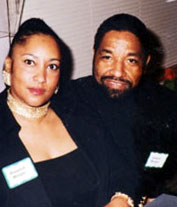Shocking Verdict in Morgan Trial
Photo: Morgan with his wife, Rosalind
 By Ted Pearson
By Ted Pearson
Progressive America Rising
People were stunned yesterday afternoon when jurors, after only 3 hours of deliberation, returned a verdict of “guilty” on all counts against Howard Morgan for the attempted murder of four policemen. Morgan had been shot 28 times by these same policemen after a routine traffic stop at 1:00 am on February 21, 2005 in the Lawndale community on the West Side. His $1 million bail was immediately revoked and he was taken away by Sheriff’s police, who refused to allow him to even hug his daughters in the courtroom.
The more than 25 mostly white uniformed Chicago policemen who had packed the courtroom before the verdict celebrated the racist verdict. The Fraternal Order of Police web site posted also celebrated their “victory,” which they called “justice for our own.”
Observers noted that it is not uncommon in state criminal cases that bail is revoked pending appeals. Attorneys representing Morgan said they would immediately file a motion for a new trial and were considering appeals of the verdicts in both state and federal courts.
Morgan was taken to Cook County Jail’s Cermak Hospital due to his damaged condition resulting from the police shootings. He requires assistance in walking and regular medication.
I witnessed much of the trial testimony. Upon learning of the verdicts, it is clear that this jury of ten white people and only two African Americans did not take any time to reviewing nine full days of testimony by witnesses for the prosecution or the defense. They simply wanted to go home, so they did what was expected of them by the system – they quickly brought back the verdict of ‘Guilty.’ That in itself ought to be grounds for Morgan to be granted a new trial.
The police who tried to murder Howard Morgan should be dismissed from the force and the U. S. Attorney should immediately launch an investigation into the conspiracy to cover-up this heinous crime against humanity. No one, including the Chiefs of Police, Chicago’s Mayors, and the State’s Attorneys responsible for this ongoing conspiracy should be exempt from this investigation. Current State’s Attorney Anita Alvarez especially should be brought before the bar of justice for her role in prosecuting this racist case.
This case reeks of the kind of white supremacy that shocked the nation 80 years ago when nine Black teenagers were falsely accused and sentenced to death in Alabama for the rape of two white girls on the flimsiest of evidence. This case calls for the same level of national and international outrage that ultimately saved the lives of those men. People who care about democracy and fairness will demand that Howard Morgan be freed immediately on bail, that he get a new trial, or that the ridiculous charges against him be dropped.
Only a loud massive public outcry can free Howard Morgan at this point. The criminal justice system will not do it if left alone. Just as in the case of Angela Davis, who inspired the founding of our organization 39 years ago and who was granted bail while being held on a capital murder-conspiracy charge, it will take a broad and irresistible demand by the people that Morgan be allowed to make bail during his appeals, and that the charges against him be dropped.
For the jury the case came down to whom to believe: four white rookie policemen who did all the shooting or Howard Morgan, the young African American woman who witnessed the police crime, and Morgan’s attorneys, both of whom are Black. The testimony given by all the witnesses was essentially the same as that given in Morgan’s first trial 5 years ago, at which he was acquitted of aggravated battery with a firearm in the cases of all but one of the officers, but at which the jury was deadlocked over whether or not he had attempted to murder them.
Charice Rush was a young teenaged woman who was out late that night in February 2005. She testified at the trial that she witnessed what happened as she sat in her parked car in front nbear the incident. She saw the police pull Morgan’s minivan over and with their guns drawn forcibly pull him from the driver’s seat and throw him to the ground. She said she saw them open fire on Morgan as he lay on the ground. She said that she did not see Morgan with a gun in his hands at any time.
Morgan is an eight-year veteran of the Chicago Police Department and a thirteen year career policeman for the Burlington Northern Santa Fe Railroad. He was required to carry a weapon on his job, and he normally carried it when on his way to and from work, as proscribed by Illinois law.
Morgan himself testified that he had been on his way to a family home he was remolding before he had to report for work at 6:00 am that day. He pulled over to let a police squad car with its lights flashing behind him pass, and was surprised when instead they pulled up, got out of their car and approached his vehicle. He said they pulled him out of his mini-van in an unprovoked attack, grabbed the gun he carried for work from his belt, and started shooting. He tried to tell them he was a policeman to no avail. He said he lost consciousness after several shots.
In contrast to the story told by Rush and Morgan, Policemen Timothy Finley and John Wrigley said they first observed the mini-van driven by Morgan going the wrong way down a one way street with its lights off. They followed the van with their lights flashing as it made only “rolling stops” at three stop signs after turning onto 19th St. Another squad car with Policemen Nick Olsen and Eric White came on the scene. When the van finally pulled over Morgan got out of the van. They got out of their car with guns drawn and ordered Morgan to place his hands on the side of the van. As they patted him down he turned on them, drew a gun from his waistband and opened fire on them. They ran for cover behind their cars and returned fire until Morgan ran out of bullets.
However, the testimony of the police, along with a lot of the evidence presented by the prosecution, was contradictory. Some of the police testified that Morgan ended up lying on his back. Some of them testified he ended up lying on his stomach. No one testified that they had turned him over.
Photographs of the van taken by police evidence technicians all showed that the van was parked with its lights on. The police testified that the lights were off all the time, which is why they said they were first drawn to the van.
The police said they stopped firing when Morgan ran out of bullets. Officer Eric White, however, testified that he had stood over shot Morgan and shot him in the back and struck him in the head after the shooting stopped “to protect my fellow-officers,” as he lay on his stomach in the street.
The police all testified that several hours after the shooting they each engaged in “roundtable” discussions about the incident with police officials and attorneys from the State’s Attorney’s office.
The prosecution guaranteed that the jury would not pay attention by presenting a seemingly endless account of every shell casing and ever bullet fragment found at the scene in the greatest possible detail. These included some casings and bullets fired from Morgan’s own gun. Significantly, the police identified only three of the twenty-eight bullets taken from Morgan’s body by the surgeons who treated him at Mt. Sinai Hospital. They did not say what happened to the other 25 bullets or if they had been kept. They also did not keep or indentify any of the many bullets that pierced the mini-van, which they confiscated and had destroyed (crushed) before any forensic investigation of it could be done.
Since Morgan testified that the police had taken his gun immediately, and when everything was over that gun’s bullets had all been fired, it was a major error not to have preserved the bullets that hit Morgan and could have established that some of them came from his own gun fired by police.
An independent observer of the proceedings would have come away with a picture of what happened very different from that accepted by the jury. Howard Morgan, after a dinner at home with his family where they were living on the South Side, decided to go to the family home he was renovating in Lawndale on his way to work that February 21 in 2005. On his way he was pulled over by four very young, white rookie policemen just before 1:00 am. They had been hyped up with warnings from their superiors that Lawndale was all Black, and was a “high risk” neighborhood.
They got out of their cars with guns drawn and pulled Morgan from his car. They threw him to the ground. One of them saw the pistol that he was legally carrying and shouted “Gun!” Perhaps he or another officer grabbed it from his belt. The others immediately started firing and continued firing until they thought Morgan was dead.
They were terrible shots in their panicked state. In addition to the 28 bullets that went into Morgan’s body collapsed on the ground they fired wildly. Countless rounds pierced the side and rear of the van, and others ended up in furniture and walls in nearby apartments. Two of their shots wounded their fellow officers.
In other words, they panicked and went on a rampage. It is only because of their poor shooting and, as Morgan’s wife Rosalind always pints out, the grace of God that can be responsible for the fact that Morgan was not murdered.
Once they realized that Morgan was not dead and others arrived on the scene they had to invent a story to explain their behavior. The “roundtable” discussions they held later that day with representatives of the State’s Attorney and the Fraternal Order of Police helped them get their stories straight.
They charged Morgan with attempted murder of the police and conspired to convict him, to save their careers, their department, and the City from the millions that would otherwise be due to their victim for the permanent damage and terrible suffering they have put him, his family, and his community through.
Morgan’s attorneys are Randolph Stone and Herschella Conyers are both Professors of Clinical Law at the Mandel Legal Clinic of the University of Chicago. Stone was, for many years, the chief Public Defender of Cook County.
Ted Pearson is Co-Chairperson of the Chicago Alliance Against Racist and Political Repression,
People can support Morgan’s legal defense by sending checks or money orders to the Howard Morgan Defense Fund, c/o Church of God, 1738 W. Marquette Rd, Chicago 60636.
Morgan’s address is Howard Morgan 2012-0127254 Cook County Jail P.O. Box 089002 Chicago, Illinois 60608






![[PDA - Heathcare NOT Warfare - Sign the Petition.]](http://pdamerica.org/images/ads/HealthNotWar_final.jpg)


